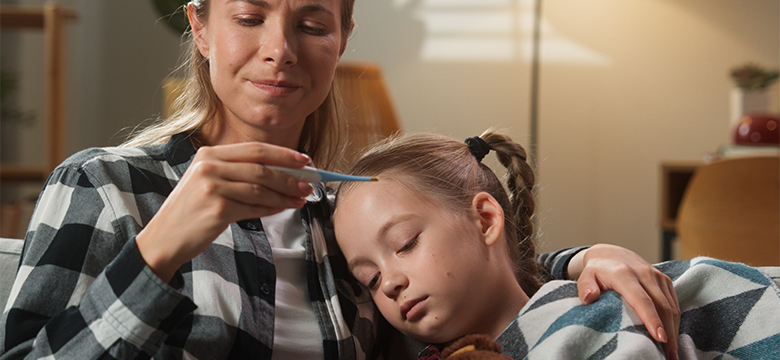
When your child develops a high temperature, it’s natural to feel worried. Fevers are a common sign that the body is fighting an infection, but sometimes, a high fever in children can indicate something more serious. Knowing when to monitor symptoms at home and when to seek medical help is key to ensuring your child’s health and safety.
This comprehensive guide explores the causes, symptoms, and treatments for high fever in children, alongside clear guidance on when to see a GP.
A fever is when your child’s body temperature rises above normal — typically 38°C or higher (as per NHS guidance). It’s not an illness itself but a symptom that your child’s immune system is working to fight infection.
Fevers are most often caused by viral or bacterial infections, though sometimes, environmental factors or vaccinations can trigger them too.
Normal Child Temperature Range
If your child’s fever rises above 39°C, persists for more than a few days, or is accompanied by other worrying symptoms, it’s best to consult a GP for evaluation.
While most fevers resolve on their own, it’s useful to understand what might be causing them.
The majority of fevers in children are caused by viral infections such as:
These fevers usually subside within three to four days as the body clears the virus.
Sometimes, bacteria can cause a high temperature in a child. Common bacterial sources include:
Bacterial infections often require antibiotics, so professional assessment is important.
Mild fever can occur when babies are teething or after routine vaccinations. These are generally harmless and temporary.
Less commonly, persistent fever in children can be linked to inflammatory conditions, autoimmune issues, or even heat exhaustion during summer months.
When your child has a fever, it’s not just the number on the thermometer that matters — it’s how your child looks and feels.
Keep an eye out for:
If your child is under 3 months old and has a fever of 38°C or higher, or under 6 months old with a fever over 39°C, seek immediate medical attention.
Parents often ask: “When should I worry about a high temperature in my child?”
Here are some red flags that mean it’s time to see a doctor:
These symptoms may indicate something more serious, such as a chest infection or bacterial illness, and should not be ignored.
Fever causes fluid loss through sweating. Offer plenty of water, milk, or diluted juice to prevent dehydration.
Avoid overdressing your child. Light clothing and a cool room help regulate body temperature naturally.
You can give paracetamol or ibuprofen suitable for your child’s age to reduce discomfort and temperature. Always follow the correct dosage on the packaging or as advised by your GP.
Encourage rest. Sleep helps the immune system fight off infection faster.
These outdated remedies can shock the system and should be avoided.
If your child’s fever does not respond to basic care, or if you’re concerned about their symptoms, seeing a GP is the safest choice.
A GP can:
For parents who prefer fast access and personalised care, booking a private GP appointment can make all the difference — especially if your child’s fever persists or worsens overnight.
If you’re interested in a comprehensive overview of related health issues, you may also find our guide on headaches every day? common causes and gp advice helpful. It explains when persistent headaches could indicate underlying health conditions — another important topic for parents monitoring their child’s wellbeing.
While it’s impossible to prevent every fever, you can lower the risk by following a few key practices:
A healthy immune system helps your child recover more quickly if they do get sick.
Many parents wonder how much a private consultation costs. Fees vary depending on the service and whether follow-up tests are required. To see transparent pricing for GP consultations, you can visit the Private Doctor London Fees page for details.
A high fever in children is often the body’s natural response to infection — but knowing when to worry and seek help is essential. Trust your instincts as a parent: if your child seems unusually unwell, weak, or confused, never hesitate to consult a GP.
Quick access to medical care can make a huge difference in early diagnosis and recovery. If you’re concerned about your child’s symptoms, book an appointment with a Private GP in London today through Private Doctor London.
Your child’s health is always the top priority — and professional medical advice ensures peace of mind and the best possible care.